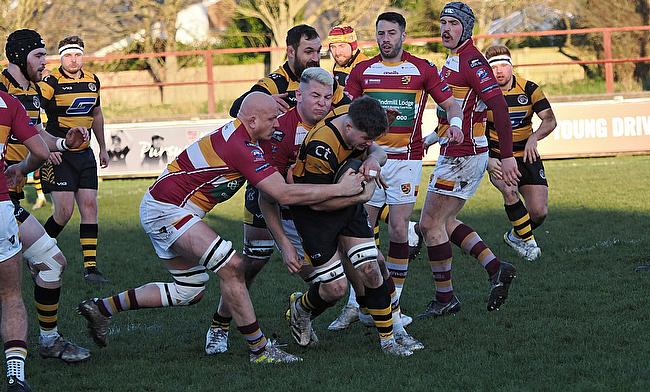The role of semi-pro rugby in England - Does it have a future?

Nelson is part of the fabric at National Two North club Fylde
©Chris Farrow
It's difficult to reflect on the last 12 months of rugby with much positivity.
The disastrous decline of Worcester Warriors and Wasps was a strong narrative which dominated column inches in the final third of 2022 and the alarming situation towards the top of the English game is something which isn't going to be resolved with a click of the fingers.
Negative headlines around World Rugby, an England team which underwhelmed and confirmation that some of the leading stars of the Gallagher Premiership will be heading overseas all adds up to a worrying picture.
But it's below the bright lights of the top tier and the international stage where Lancashire Head Coach and Fylde Senior Coaching Consultant Mark Nelson would like the Rugby Football Union to focus more of their attention on in 2023.
The structure around level three and below becomes the epicentre of our conversation and some of the challenges that face the semi-pro game is something Nelson is keen to address.
"What you can reasonably expect the RFU to do is to hopefully support clubs and develop the game as a whole in terms of infrastructure," Nelson tells TRU. "The clubs, certainly in National Two North [level four] which is where I am involved, are all ready and have had to operate within what they can afford.
"You have got the grounds, you've got the facilities but really upgrading those facilities like your changing rooms, the physio and medical provisions, the playing surface, the clubhouses themselves, the car parks, the accessibility, the training facilities in terms of the provision of equipment, upskilling coaching, refereeing development, all of those things can help clubs and take away the burden of having to pay for all of their infrastructure as well as having to pay for semi-pro players and travel."
Back in October, Nelson was vocal on social media in response to a column written by Brian Moore for The Telegraph. In the piece, he suggested clubs at semi-pro level were spending funds given to them by the RFU on player wages. Nelson strongly disagreed and states any future investment which the governing body might be able to provide could allow clubs to improve their offering away from the 80 minutes of rugby.
"I recognise the RFU has its priorities and there are funding troubles across the game, but if the RFU say we want to focus £10,000, £20,000 a season for projects, that would free up the clubs to then make a valued decision of what they can afford to pay players within a payment cap which they have got in place. Any external contribution can help with the bigger picture.
"I think then you have got funding streaming for infrastructure from the RFU, you've got a salary cap which the clubs work within and then that is funded by local sponsorship, money coming through the gate, the bar and it is revenue clubs can generate within that defined payment scheme. I think and hope that idea could work."
One of the other areas which Nelson is keen to pinpoint is decentralising responsibilities at the RFU.
Many are unconvinced that those within the walls of Twickenham take much interest in the goings-on outside of the elite game and having worked for the governing body earlier in his career, Nelson feels having people on the ground away from England HQ can be more influential.
"I always say you learn from the past," Nelson adds. "In the past when I was working for the RFU, I was a Youth Development Officer and we were run by a National Youth Development Officer but there were also DTA's (Divisional Technical Administrators).
"They were in the North, the Midlands, the South East and the South West. They looked after the counties and then in the counties, they looked after the clubs.
"I think they should go back to that. Instead of centralisation, it should be decentralised because what works in Northumberland, doesn't necessarily work in Cornwall. What works in Kent, doesn't work in Cumbria. I think if you have got boots on the ground from the RFU in the areas of the country that need it most and those people have got expertise there, I think it can work hand in glove. The game can actually take off.
"I think rather than looking at the future and thinking we are worried about where we are going, you can spin that coin and say we can be really positive but the RFU have got to do the appropriate action because it will hopefully offer a better future for the semi-pro game."
Nelson also feels having a stronger emphasis on player opportunities at semi-pro level will not only create a more attractive product but could aid participation numbers.
The emergence from the Covid-19 pandemic revealed a decrease in people playing the game in England, with many not returning to their clubs due to societal changes and alternative commitments. This week, RFU CEO Bill Sweeney stated on The Good, The Bad &The Rugby podcast that particaption numbers were "about 170,000" compared to nearly 260,000 in 2016.
Nelson would love to see the counties aspect of the game elevated as well as the reintroduction of the England Counties programme - which was scrapped by the RFU during the pandemic - because the opportunity to play at a high level might be a way to entice players back into the sport.
"If you run the National Leagues alongside a county or a representational programme with England Counties at the top of it, you've then got the best of both worlds which is opportunities for players to play really good competitive club rugby and then, in the right part of the season, play county rugby which leads to a final at Twickenham before possibly getting representative honours for England Counties.
"Things like promoting rugby at county level may bring people back into playing with club's third teams, fourth teams. Players that have walked away during Covid will hopefully come back because the product that is on offer is more attractive to them but also it could encourage more people to come along and watch.
"I go back to it again because these things have worked in the past and have been eroded away because of this obsession with the 'elite' end of the game. I think it is now time to really revisit where the real strength and hub of the game is and that is in the shires, that is in the National Leagues and that is what is referred to as the semi-pro game and/or the grassroots.
"If the semi-pro game is really developed in conjunction with the RFU with the clubs and with the counties, then the whole game will rise a level."
While Nelson is hoping for improvements in certain departments of the semi-pro game, he isn't oblivious to the decisions the RFU have made over the last 12 months which he feels they deserve credit for.
The 'flattening of the rugby pyramid' at community level (levels three and below)- which was implemented at the beginning of the 2021-22 season - was designed to improve player rendition and attract new players to the sport by minimising travel and decreasing the number of teams in each league, thereby reducing the number of fixtures.
For Nelson, it proves the governing body are listening: "The new format of the leagues at levels three and below, they have a more regional feel to them. I think in the short time we have had them, they have been successful and the RFU made that decision based on feedback from people within clubs at these levels.
"Looking at the National Leagues, the changes have, for the large majority, taken away setting off at stupid o'clock in the morning and getting back at stupid o'clock at night. The Saturday experience is now compressed for most players. It is not as onerous as it potentially has been.
"I think the RFU have pretty much got it sorted out there and the National Leagues are well run by people who are experienced at that level of the game. I think what the RFU need to look at, and I think Bill Sweeney from the conversations I have had with him and he is aware of this, is the big cohort of potential in the game is actually in the semi-pro game and not necessarily in the professional game which should really, by definition, take care of itself."
Nelson might be biased, but the praise he heaps on National League Rugby is justified. Clubs in levels three and four have battled through the pandemic and week after week, they are producing entertaining and competitive rugby from Tynedale down to Redruth. While there are financial headaches at the top of the game, clubs further down the ladder have just had to crack on with things.
It is clear that Nelson, who lives and breathes the sport, wants the RFU to cast its net a little wider this year in order to provide clubs below the top tier with an opportunity to develop the infrastructure in the semi-pro circle.
"I want to see a real positive approach to both the semi-pro game at club level and the county game which really develops that level of the game going forward and gives opportunities for the coaches, players, referees, clubs and counties all to flourish."
What the future holds is anyone's guess but the future of semi-pro rugby and the grassroots game is something Nelson hopes is towards the top of the RFU's agenda for 2023.







.jpg)

